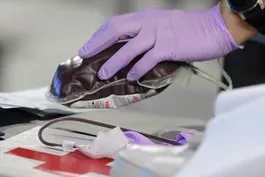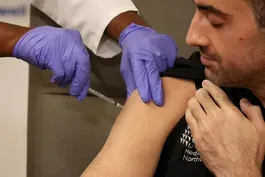
The future of debt relief for Black farmers in America
Clip: 8/24/2024 | 6m 58sVideo has Closed Captions
The future of debt relief for Black farmers after decades of discrimination
According to federal data, there were about 925,000 Black farmers in 1920 in the United States. A century later, that number has declined to only about 42,000. John Boyd Jr., founder and president of the National Black Farmers Association, joins Ali Rogin to discuss efforts by the Biden administration to help farmers who have been historically excluded from government assistance programs.
Problems with Closed Captions? Closed Captioning Feedback
Problems with Closed Captions? Closed Captioning Feedback
Major corporate funding for the PBS News Hour is provided by BDO, BNSF, Consumer Cellular, American Cruise Lines, and Raymond James. Funding for the PBS NewsHour Weekend is provided by...

The future of debt relief for Black farmers in America
Clip: 8/24/2024 | 6m 58sVideo has Closed Captions
According to federal data, there were about 925,000 Black farmers in 1920 in the United States. A century later, that number has declined to only about 42,000. John Boyd Jr., founder and president of the National Black Farmers Association, joins Ali Rogin to discuss efforts by the Biden administration to help farmers who have been historically excluded from government assistance programs.
Problems with Closed Captions? Closed Captioning Feedback
How to Watch PBS News Hour
PBS News Hour is available to stream on pbs.org and the free PBS App, available on iPhone, Apple TV, Android TV, Android smartphones, Amazon Fire TV, Amazon Fire Tablet, Roku, Samsung Smart TV, and Vizio.
Providing Support for PBS.org
Learn Moreabout PBS online sponsorshipJOHN YANG: In 1920 according to federal data, there were about 925,000 black farmers in America, or about 14 percent of all farmers.
A century later, there were only about 42,000 or about 1 percent, much of that is a legacy of systemic discrimination in Agriculture Department programs.
Ali Rogin reports on how the Biden administration is trying to help farmers who have been historically excluded from government assistance programs.
ALI ROGIN: Today, black farmers own less than 1 percent of U.S. farmland, according to the Agriculture Department's latest farmer census, but efforts are underway to help these farmers reclaim their lost land.
Last month, the USDA issued over $2.2 billion in payments to black and other minority farmers across the country.
It's a move the department hopes will offset decades of discrimination these farmers face when trying to secure loans.
John Boyd is the founder and president of the National Black Farmers Association.
Mr. Boyd, thank you so much for joining us.
You yourself are a fourth generation farmer.
I'd like to ask you about the discrimination that you personally have faced over the course of your career.
JOHN BOYD, National Black Farmers Association: The discrimination that I faced was more in your face, blatant type of discrimination.
There are many black farmers in the area experienced.
You know, I was called the N word.
I was spat on that had my application torn up and thrown in trash can in front of me.
And this person that was responsible for making farm loans in my local county office would only see black farmers on Wednesday, so we named it Black Wednesday.
When white farmers came in, he would bring them in service them.
And one particular year he his farmer, Earl, he passed him a check for $157,000 in front of me, after he told me a qualified borrower that he wasn't going to lend me $5,000 of his money.
This farmer walked out the door and he said, hey, Earl, I need you to come back in and fill out them papers, because I used last year's numbers to make this known.
So here, this farmer hadn't even applied, and he didn't even process my loan application there in front of me, that type of discrimination put thousands of black farmers out of business.
We've lost millions of acres of land because of blatant discrimination that we face for decades.
This went on for decades, unchecked by Congress President, not the president.
I visited with every president since Jimmy Carter to talk about discrimination that black farmers faced in this country, so a very, very long time.
ALI ROGIN: And as you mentioned these are systemic issues that happened all over the country for farmers like yourself and of course, many farmers yourself included, feel that these payments have been well overdue.
Tell me about the journey that it's taken to get to this point.
JOHN BOYD: Well, first of all, I'm proud to have led the fight that led to this $2.2 billion pay up.
These payments are timely for thousands of black farmers who are facing farm foreclosure.
These payments are timely for farmers who can't pay their bills and send their kids to college.
And this wasn't a black payout, the way that people are describing it.
These were payments made to black farmers and others because of the discrimination that we face at the hands of the United States Department of Agriculture, the very federal arm that was supposed to be lending a hand up for black farmers, was denying us the opportunity to farm in this country the way that white farmers did.
ALI ROGIN: And I know you fought to get an additional $5 billion in debt relief, but that was held up in court by white farmers who argued that they were being discriminated against.
Can you tell me about that?
JOHN BOYD: When I first started this campaign, 41 years ago, my farmers in federal inventory, right along with many other black farmers, 120 percent, 100 percent for debt, right off, 20 percent to pay the taxes.
We are still in court, in federal court, represented by attorney Ben Crum that's looking to seek those 5 billion in actual debt relief.
We didn't get it.
It was blocked because white farmers were suing us in federal court around the country.
They were successful in two courts, Florida and Texas putting a temporary injunction in place blocking the $5 billion.
I'm currently reaching out to the Biden administration, and I'm asking them to make that happen by executive order the $5 billion the same way that they've done for student loan debt forgiveness by executive order.
So they felt the pressure of large scale white farmers and basically said, hey, you know, we don't want to move forward, but we're going to do some other initiatives to replace that.
But I'm steadfast, and I'm holding my feet firm, because land is the only way to pass down generational wealth.
So the next generation of black farmers, my daddy and grandfather said land is the only way to freedom.
Every good and great thing comes from land, food to put on the table, timber to build the house, clean drinking water.
And when you lose the land, people, you lose a part of your identity, you lose a part of your history.
And we've lost in this country, at the turn the century, we were tilling 20 million acres of land.
We're down to 3 million acres of land.
So we've blown our land.
And I'm not going to give up the fight by the grace of God.
I think he's going to bring relief for black farmers in the form of land ownership in this country.
ALI ROGIN: Finally, the Republican vice presidential candidate J.D.
Vance commented on these payouts.
And I'd like to play the sound for you.
J.D.
VANCE, Republican Vice Presidential Nominee: The Harris administration, for example, handed out farm benefits to people based on skin color.
I think that's disgraceful.
I don't think we should say you get farm benefits if you're a black farmer, you don't get farm benefits if you're a white farmer.
ALI ROGIN: What's your response to him?
JOHN BOYD: That he can say that to our nation's black farmers, the oldest occupation in history for black people in this country, we were slaves.
We came through on Jim Crow.
We came through on sharecropping.
And to have someone who wants to be Vice President of the United States make those types of comments, that's not the way of the future.
That's not the way to bring this country together, but to have him say it was based on skin color when it was totally based on discrimination, and he knows that as a member of the Senate.
So his comments to me are deplorable, and he needs to apologize to black people in this country and directly to Black Farmers.
ALI ROGIN: John Boyd, founder and president of the National Black Farmers Association, thank you so much for joining us.
JOHN BOYD: Thank you so much for having me.
How extreme heat is contributing to a U.S. blood shortage
Video has Closed Captions
How extreme heat is contributing to a nationwide blood shortage (5m 11s)
Residents try to save Tangier Island amid rising sea levels
Video has Closed Captions
Tangier Island residents work to preserve culture threatened by rising sea levels (3m 11s)
What a COVID vaccine program’s end means for the uninsured
Video has Closed Captions
What the end of a COVID vaccine access program means for uninsured Americans (4m 13s)
Providing Support for PBS.org
Learn Moreabout PBS online sponsorshipMajor corporate funding for the PBS News Hour is provided by BDO, BNSF, Consumer Cellular, American Cruise Lines, and Raymond James. Funding for the PBS NewsHour Weekend is provided by...














